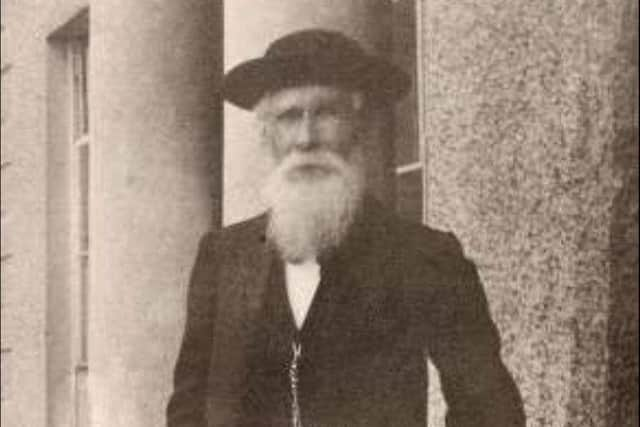John Kells Ingram: The son of an Ulster-Scots minister hailed as 'best educated man in Europe'


Originally Scottish Presbyterians, the family converted to Anglicanism.
John Kells Ingram's father, the Rev William Ingram, was a scholar at Trinity College, Dublin, and curate of Killeevan (1806) and curate of Templecarn (1809-29). Templecarn may be regarded as the ecclesiastical name for Pettigo.
Advertisement
Hide AdAdvertisement
Hide AdJohn Ingram, John Kells Ingram's grandfather, owned a linen mill and a linen-bleaching enterprise in Glennane in Co Armagh. In the 1780s John Ingram was active in the Volunteer movement and raised and financed a Volunteer corps which was variously known as the Lisdrumhure Volunteers or as the Mountnorris Volunteers.
John Kells Ingram had a very long and distinguished academic career. In the course of his career at Trinity College, Dublin, he became Professor of Oratory and English Literature, Regius Professor of Greek, Librarian, Senior Fellow and eventually Vice-Provost.
In his role as college librarian, he was responsible for opening up the library to the general public so that they could see the Book of Kells and the other great literary treasures in the possession of Trinity College.
He also achieved distinction as an economist, a poet and a mathematician (and is credited, along with John William Stubbs, with introducing the geometric concept of inversion in a circle).
Advertisement
Hide AdAdvertisement
Hide AdThe sheer range of his interests is staggering. He was president of the Statistical and Social Inquiry Society between 1878 and 1880 and took over as president of the Royal Irish Academy when William Reeves, the Church of Ireland Bishop of Down, Connor & Dromore and distinguished antiquarian, died in 1892.
John Kells Ingram’s enduring claim to fame is his authorship of the ballad ‘The Memory of the Dead’ but more often referred to as ‘Who fears to speak of Ninety-Eight?’ which honours the memory of the United Irishmen and the 1798 rebellion.
Who fears to speak of Ninety-Eight?Who blushes at the name?When cowards mock the patriots' fate,Who hangs his head for shame?He’s all a knave or half a slaveWho slights his country thus,But a true man, like you, man,Will fill your glass with us.
We drink the memory of the brave,The faithful and the few.
The ballad was written overnight after Ingram had spent an evening arguing Irish politics and history with a group of fellow Protestant students at Trinity College, Dublin.
Advertisement
Hide AdAdvertisement
Hide AdIt was first published in ‘The Nation’ on April 1 1843.The author anonymously dropped it into ‘The Nation’ letterbox. It rapidly became one of the most popular of Irish nationalist songs even though in so far as these things can be ascertained Ingram never displayed any Irish nationalist sympathies. Admittedly, Wikipedia claims otherwise but without providing any substantiating evidence.
In 1900 Ingram included the ballad in a slim volume of his poetry entitled ‘Sonnets and other poems’. His ‘Prefatory Note’ is of special interest.
‘“The Memory of the Dead” was my only contribution to “The Nation”. It has already been printed with my name in several collections of Irish verse. I have reproduced it here, though differing in character and date from other pieces in the volume, because some people have believed, or affected to believe, that I am ashamed of having written it and would gladly, if I could, disclaim its authorship. Those who know me need not be told that this idea is without foundation. I think the Irish race should be grateful to the men who in other times, however mistaken may have been their policy, gave their lives for their country. But I have no sympathy with those who preach sedition in our own day when all the circumstances are radically altered. In my opinion no real, popular interest can be furthered by violence.’
‘The Memory of the Dead’ was set to music by John Edward Pigot in 1845 and translated into Latin by Robert Yelveton Tyrrell and by Douglas Hyde into Irish.
Advertisement
Hide AdAdvertisement
Hide AdJohn Kells Ingram died on May 1 1907. His funeral service was held in TCD college chapel and he was buried in Mount Jerome.
The Times in its obituary stated that ‘those who worked with Ingram in Trinity College were persuaded that he was the best educated man in Europe’, while the Irish Times stated that ‘in Dr Ingram, Ireland loses her ripest scholar and one of her most loveable and interesting personalities’.
John Kells Ingram’s younger brother, Thomas Dunbar Ingram, was Professor of Jurisprudence in Hindu and Mohammedan Law in Presidency College, Calcutta, between 1866 and 1877. On his return to Ireland, he devoted himself to historical research.
In 1887, the year after the first Home Rule bill, he wrote ‘A History of the Legislative Union of Great Britain and Ireland' which incurred the ire of W E Gladstone because it was written from an avowedly unionist perspective.
Thomas Dunbar Ingram died December 30 1901 in Dublin and, like his brother, is buried in Mount Jerome cemetery.